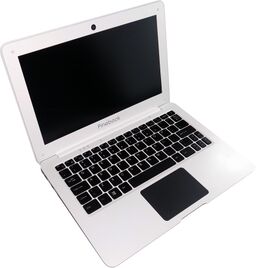NixOS on ARM/PINE64 Pinebook
The Pinebook (sometimes referred as pinebook-a64) is a laptop design based on the Allwinner A64 SoC. It was available in two sizes, 11.6" and 14", but is now only available as 11.6". The 11.6" has two resolutions, first models had a 1366×768 panel, while the more recent ones have a 1920×1080 panel.
| PINEBOOK | |
|---|---|

| |
| Manufacturer | PINE64 (Pine Microsystems Inc.) |
| Architecture | AArch64 |
| Bootloader | Upstream U-Boot[1] |
| Boot order | SD, eMMC |
| Maintainer | samueldr |
It can boot from SD or from an included and replaceable eMMC module.
Status
Upstream NixOS AArch64 image boots on the PINE A64-LTS, using the proper upstream U-Boot.
U-boot support has been added 2019-05-18. The bootloader has not been built for now.
Board-specific installation notes
First follow the generic installation steps to get the installer image on an SD card. Copying to the eMMC directly should work, but requires disassembly of the computer.
U-Boot needs to be copied to specific sectors on the microSD card with dd. Download U-Boot for the board (sopine-u-boot-sunxi-with-spl.bin), and copy it to the correct location with (again, replace /dev/sdX with the correct path to the SD card device):
sudo dd if=sopine-u-boot-sunxi-with-spl.bin of=/dev/sdX bs=1024 seek=8
Serial console
Details about the pinout for the headphone jack are available on the PINE64 wiki. It is also available on their store. The serial settings are the usual Allwinner settings.
On early models[Which?] serial needs to be toggled via software. On recent models, a physical switch is present on the main board. The linux-sunxi wiki's Pinebook page has details about serial access.
Compatibility notes
| Mainline kernel | |
|---|---|
| Display |
|
| HDMI |
|
Downstream kernel
Resources
- Official product page
- [linux-sunxi.org/Pine_Pinebook linux-sunxi wiki page]